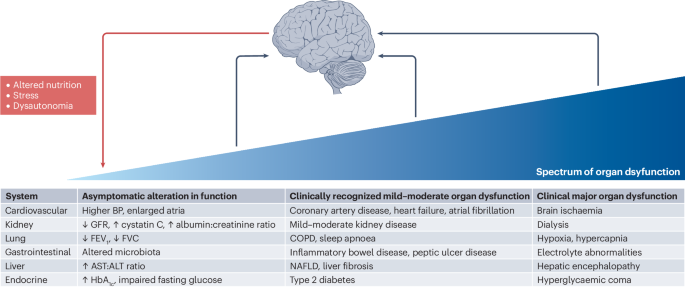전한울
2024년 10월 6일
- importance of considering peripheral organ health in the context of brain health and dementia, advocating for a more integrated approach to research and clinical practice.
<논문요약>
Peripheral Organ Contribution: The traditional view focused on intrinsic brain processes as the primary threats to brain health. However, the review emphasizes that dysfunction in peripheral organs, such as the heart, gut, liver, kidney, and lungs, also plays a crucial role in brain dysfunction and neurodegeneration, particularly dementia.
Cognitive Decline and Heart Failure: The review presents evidence that individuals with heart failure are at a heightened risk of cognitive decline and dementia. A systematic review indicated that heart failure correlates with poorer cognitive performance across various domains, including global cognition and memory, with significant effect sizes.
Mechanisms of Brain Health Impact: The paper discusses mechanisms through which organ dysfunction affects brain health, such as reduced cerebral perfusion due to cardiac issues. This reduction can lead to increased blood-brain barrier permeability, which may contribute to neurodegenerative processes.
Associations with Other Conditions: The review also notes associations between gastrointestinal conditions, like gastroesophageal reflux disease and irritable bowel syndrome, and an increased risk of dementia. This suggests that gut health may also influence brain health.
Need for Further Research: The authors call for more comprehensive studies, including randomized controlled trials, to verify the impact of organ function improvement on dementia risk. They highlight the challenges in conducting such studies due to their required size and duration.
Clinical Implications: The review suggests that clinical trials for systemic organ diseases should incorporate cognitive assessments to better understand the relationship between organ dysfunction and cognitive decline.
Biomarkers and Future Studies: The potential for using biomarkers from peripheral blood to study the associations between organ dysfunction and neurodegenerative diseases like Alzheimer’s and Parkinson’s is also discussed, indicating a promising direction for future research.
These findings underscore the importance of considering peripheral organ health in the context of brain health and dementia, advocating for a more integrated approach to research and clinical practice.
Abstract
Preservation of brain health is a worldwide priority. The traditional view is that the major threats to the ageing brain lie within the brain itself. Consequently, therapeutic approaches have focused on protecting the brain from these presumably intrinsic pathogenic processes. However, an increasing body of evidence has unveiled a previously under-recognized contribution of peripheral organs to brain dysfunction and damage. Thus, in addition to the well-known impact of diseases of the heart and endocrine glands on the brain, accumulating data suggest that dysfunction of other organs, such as gut, liver, kidney and lung, substantially afects the development and clinical manifestation of age-related brain pathologies. In this Review, a framework is provided to indicate how organ dysfunction can alter brain homeostasis and promote neurodegeneration, with a focus on dementia. We delineate the associations of subclinical dysfunction in specifc organs with dementia risk and provide suggestions for public health promotion and clinical management.


